Unit-5-The-Day-Mother-Cried课文翻译大学英语三
- 格式:doc
- 大小:64.50 KB
- 文档页数:4

Writing Three Thank-You LettersAlex Haley1 It was 1943, duringWorld War II, and I was a young U. S. coastgu ardsma n. My ship, the USS Murzim, had been under way for several days. Most of her holds contain ed thousan ds of cartons of cannedor dried foods. The other holds were loadedwith five-hundred-pound bombs packeddelicat ely in paddedracks. Our destina tion was a big base on the islandof Tulagiin the South Pacific.写三封感谢信亚利克斯·黑利那是在二战期间的1943年,我是个年轻的美国海岸警卫队队员。
我们的船,美国军舰军市一号已出海多日。
多数船舱装着成千上万箱罐装或风干的食品。
其余的船舱装着不少五百磅重的炸弹,都小心翼翼地放在垫过的架子上。
我们的目的地是南太平洋图拉吉岛上一个规模很大的基地。
2 I was one of the Murzim's several cooks and, quite the same as for folk ashore,this Thanksg ivingmorning had seen us busilyprepari ng a traditi onal dinnerfeaturi ng roast turkey.我是军市一号上的一个厨师,跟岸上的人一样,那个感恩节的上午,我们忙着在准备一道以烤火鸡为主的传统菜肴。
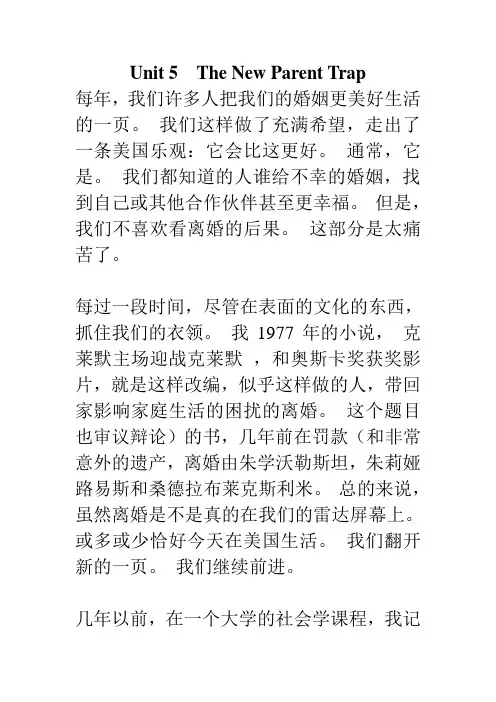
Unit 5 The New Parent Trap每年,我们许多人把我们的婚姻更美好生活的一页。
我们这样做了充满希望,走出了一条美国乐观:它会比这更好。
通常,它是。
我们都知道的人谁给不幸的婚姻,找到自己或其他合作伙伴甚至更幸福。
但是,我们不喜欢看离婚的后果。
这部分是太痛苦了。
每过一段时间,尽管在表面的文化的东西,抓住我们的衣领。
我1977年的小说,克莱默主场迎战克莱默,和奥斯卡奖获奖影片,就是这样改编,似乎这样做的人,带回家影响家庭生活的困扰的离婚。
这个题目也审议辩论)的书,几年前在罚款(和非常意外的遗产,离婚由朱学沃勒斯坦,朱莉娅路易斯和桑德拉布莱克斯利米。
总的来说,虽然离婚是不是真的在我们的雷达屏幕上。
或多或少恰好今天在美国生活。
我们翻开新的一页。
我们继续前进。
几年以前,在一个大学的社会学课程,我记得得知在结束第一次婚姻的离婚数字是百分之二十五的工作。
今天,来自美国人口普查局中常用的数字是百分之五十。
对于国家卫生统计中心,略带采取更有利的物质(和稍微不同的方法),说百分之43。
无论哪种方式,这些数字是惊人的。
大约1亿到大约1亿离婚下的孩子成为离婚的18岁以下儿童每年转换。
奇怪的是,有没有危机感的民族。
即使是离婚语言已经消毒。
请记住这个词“破碎的家庭,”这意味着损害?这几乎已经消失的文化。
在我的新小说,一个完美的离婚,好心的父母对一个十几岁的男孩-出于美国的乐观和否定好位-认为他们可以管理一个智能离婚,并保持相对的儿子为他们的痛苦。
但是,在他大学一年级,汤米伯罗斯失去他的去路。
他掉出来,从工作到工作反弹。
他的情感过山车乘坐会影响所有两岸人民的生命- 他的朋友,祖父母,雇主。
汤米的父母,罗布和Karen,就像谁相信,如果你对你的孩子爱,分手就比较顺利的许多其他问题。
在我看来,这是伟大的美国神话的完美离婚。
拉里沙利文,纽约心理医生,已经工作了30年以上的已婚夫妇,单身,离婚夫妇和离婚的孩子。
“当然是有一个神话的土地,”他说。
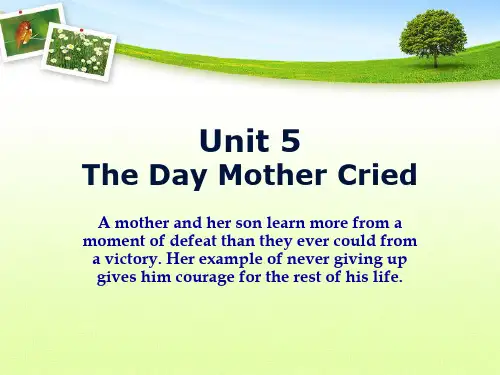
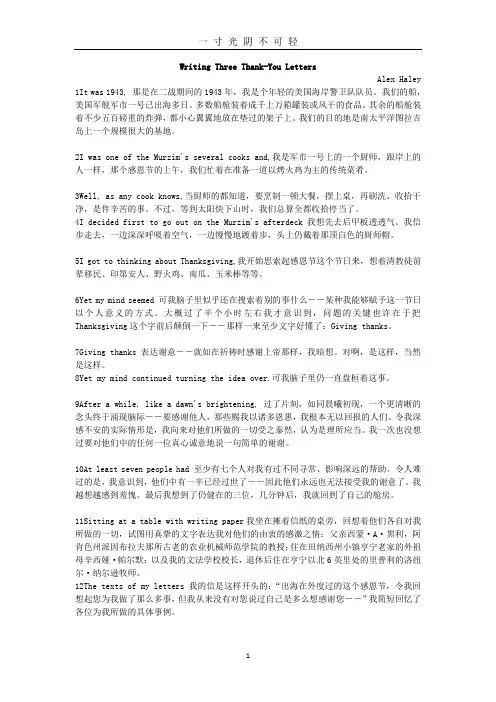
Writing Three Thank-You LettersAlex Haley 1It was 1943, 那是在二战期间的1943年,我是个年轻的美国海岸警卫队队员。
我们的船,美国军舰军市一号已出海多日。
多数船舱装着成千上万箱罐装或风干的食品。
其余的船舱装着不少五百磅重的炸弹,都小心翼翼地放在垫过的架子上。
我们的目的地是南太平洋图拉吉岛上一个规模很大的基地。
2I was one of the Murzim's several cooks and,我是军市一号上的一个厨师,跟岸上的人一样,那个感恩节的上午,我们忙着在准备一道以烤火鸡为主的传统菜肴。
3Well, as any cook knows,当厨师的都知道,要烹制一顿大餐,摆上桌,再刷洗、收拾干净,是件辛苦的事。
不过,等到太阳快下山时,我们总算全都收拾停当了。
4I decided first to go out on the Murzim's afterdeck我想先去后甲板透透气。
我信步走去,一边深深呼吸着空气,一边慢慢地踱着步,头上仍戴着那顶白色的厨师帽。
5I got to thinking about Thanksgiving,我开始思索起感恩节这个节日来,想着清教徒前辈移民、印第安人、野火鸡、南瓜、玉米棒等等。
6Yet my mind seemed 可我脑子里似乎还在搜索着别的事什么――某种我能够赋予这一节日以个人意义的方式。
大概过了半个小时左右我才意识到,问题的关键也许在于把Thanksgiving这个字前后颠倒一下――那样一来至少文字好懂了:Giving thanks。
7Giving thanks表达谢意――就如在祈祷时感谢上帝那样,我暗想。
对啊,是这样,当然是这样。
8Yet my mind continued turning the idea over.可我脑子里仍一直盘桓着这事。
9After a while, like a dawn's brightening, 过了片刻,如同晨曦初现,一个更清晰的念头终于涌现脑际――要感谢他人,那些赐我以诸多恩惠,我根本无以回报的人们。


1, 那是在二战期间的1943年,我是个年轻的美国海岸警卫队队员。
我们的船,美国军舰军市一号已出海多日。
多数船舱装着成千上万箱罐装或风干的食品。
其余的船舱装着不少五百磅重的炸弹,都小心翼翼地放在垫过的架子上。
我们的目的地是南太平洋图拉吉岛上一个规模很大的基地。
2,我是军市一号上的一个厨师,跟岸上的人一样,那个感恩节的上午,我们忙着在准备一道以烤火鸡为主的传统菜肴。
3, 当厨师的都知道,要烹制一顿大餐,摆上桌,再刷洗、收拾干净,是件辛苦的事。
不过,等到太阳快下山时,我们总算全都收拾停当了。
4,我想先去后甲板透透气。
我信步走去,一边深深呼吸着空气,一边慢慢地踱着步,头上仍戴着那顶白色的厨师帽。
5,我开始思索起感恩节这个节日来,想着清教徒前辈移民、印第安人、野火鸡、南瓜、玉米棒等等。
6,可我脑子里似乎还在搜索着别的事什么――某种我能够赋予这一节日以个人意义的方式。
大概过了半个小时左右我才意识到,问题的关键也许在于把Than ksgiv ing 这个字前后颠倒一下――那样一来至少文字好懂了:Givi ng th anks。
7,表达谢意――就如在祈祷时感谢上帝那样,我暗想。
对啊,是这样,当然是这样8,可我脑子里一直盘桓着这事。
9,过了片刻,如同晨曦初现,一个更清晰的念头终于涌现脑际――要感谢他人,那些赐我以诸多恩惠,我根本无以回报的人们。
令我深感不安的实际情形是,我向来对他们所做的一切受之泰然,认为是理所应当。
我一次也没想过要对他们中的任何一位真心诚意地说一句简单的谢谢。
10,至少有七个人对我有过不同寻常、影响深远的帮助。
令人难过的是,我意识到,他们中有一半已经过世了――因此他们永远也无法接受我的谢意了。
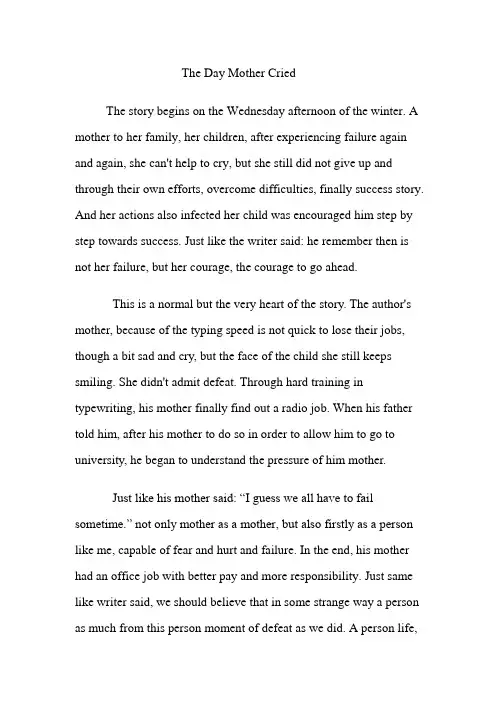
The Day Mother CriedThe story begins on the Wednesday afternoon of the winter. A mother to her family, her children, after experiencing failure again and again, she can't help to cry, but she still did not give up and through their own efforts, overcome difficulties, finally success story. And her actions also infected her child was encouraged him step by step towards success. Just like the writer said: he remember then is not her failure, but her courage, the courage to go ahead.This is a normal but the very heart of the story. The author's mother, because of the typing speed is not quick to lose their jobs, though a bit sad and cry, but the face of the child she still keeps smiling. She didn't admit defeat. Through hard training in typewriting, his mother finally find out a radio job. When his father told him, after his mother to do so in order to allow him to go to university, he began to understand the pressure of him mother.J ust like his mother said: “I guess we all have to fai l sometime.” not only mother as a mother, but also firstly as a person like me, capable of fear and hurt and failure. In the end, his mother had an office job with better pay and more responsibility. Just same like writer said, we should believe that in some strange way a person as much from this person moment of defeat as we did. A person life,we must be meeting some terrible and difficult experiences, but this can be overcome.Like writer same, when he was had trouble with a story and think about giving up or when he start to feel sorry for myself and think things should be easier for him, he must be like his mother’s way and remind him: then is not her failure, but her courage, the courage to go ahead.。
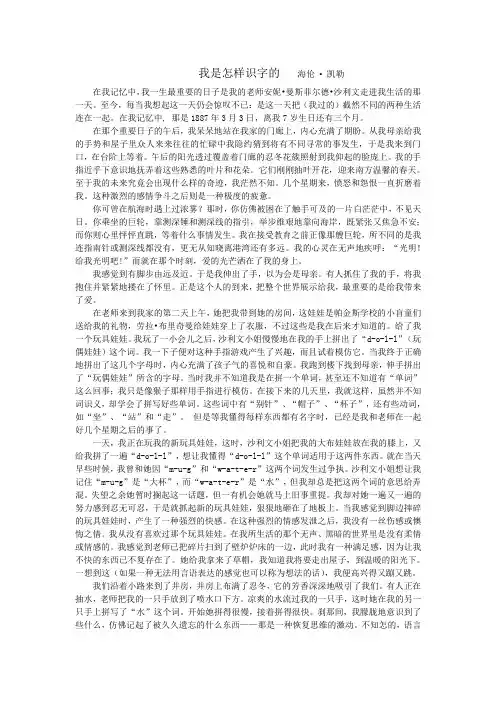
我是怎样识字的海伦• 凯勒在我记忆中,我一生最重要的日子是我的老师安妮•曼斯菲尔德•沙利文走进我生活的那一天。
至今,每当我想起这一天仍会惊叹不已:是这一天把(我过的)截然不同的两种生活连在一起。
在我记忆中, 那是1887年3月3日,离我7岁生日还有三个月。
在那个重要日子的午后,我呆呆地站在我家的门廊上,内心充满了期盼。
从我母亲给我的手势和屋子里众人来来往往的忙碌中我隐约猜到将有不同寻常的事发生,于是我来到门口,在台阶上等着。
午后的阳光透过覆盖着门廊的忍冬花簇照射到我仰起的脸庞上。
我的手指近乎下意识地抚弄着这些熟悉的叶片和花朵。
它们刚刚抽叶开花,迎来南方温馨的春天。
至于我的未来究竟会出现什么样的奇迹,我茫然不知。
几个星期来,愤怒和怨恨一直折磨着我。
这种激烈的感情争斗之后则是一种极度的疲惫。
你可曾在航海时遇上过浓雾?那时,你仿佛被困在了触手可及的一片白茫茫中,不见天日。
你乘坐的巨轮,靠测深锤和测深线的指引,举步维艰地靠向海岸,既紧张又焦急不安;而你则心里怦怦直跳,等着什么事情发生。
我在接受教育之前正像那艘巨轮,所不同的是我连指南针或测深线都没有,更无从知晓离港湾还有多远。
我的心灵在无声地疾呼:“光明!给我光明吧!”而就在那个时刻,爱的光芒洒在了我的身上。
我感觉到有脚步由远及近。
于是我伸出了手,以为会是母亲。
有人抓住了我的手,将我抱住并紧紧地搂在了怀里。
正是这个人的到来,把整个世界展示给我,最重要的是给我带来了爱。
在老师来到我家的第二天上午,她把我带到她的房间,这娃娃是帕金斯学校的小盲童们送给我的礼物,劳拉•布里奇曼给娃娃穿上了衣服,不过这些是我在后来才知道的。
给了我一个玩具娃娃。
我玩了一小会儿之后,沙利文小姐慢慢地在我的手上拼出了“d-o-l-l”(玩偶娃娃)这个词。
我一下子便对这种手指游戏产生了兴趣,而且试着模仿它。
当我终于正确地拼出了这几个字母时,内心充满了孩子气的喜悦和自豪。
我跑到楼下找到母亲,伸手拼出了“玩偶娃娃”所含的字母。
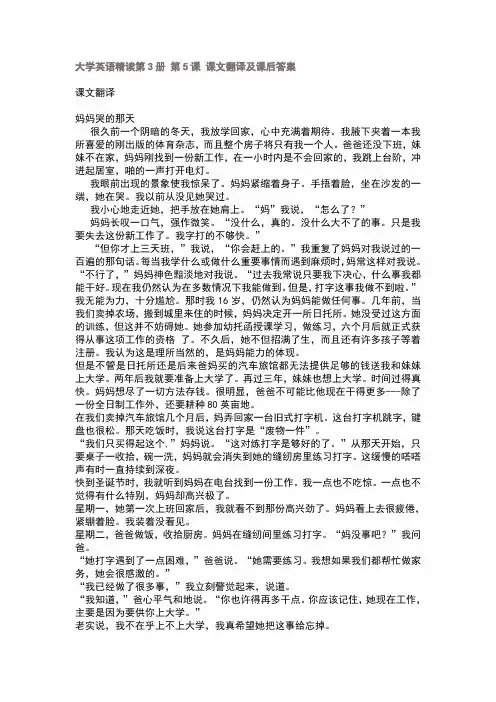
大学英语精读第3册第5课课文翻译及课后答案课文翻译妈妈哭的那天很久前一个阴暗的冬天,我放学回家,心中充满着期待。
我腋下夹着一本我所喜爱的刚出版的体育杂志,而且整个房子将只有我一个人。
爸爸还没下班,妹妹不在家,妈妈刚找到一份新工作,在一小时内是不会回家的,我跳上台阶,冲进起居室,啪的一声打开电灯。
我眼前出现的景象使我惊呆了。
妈妈紧缩着身子。
手捂着脸,坐在沙发的一端,她在哭。
我以前从没见她哭过。
我小心地走近她,把手放在她肩上。
“妈”我说,“怎么了?”妈妈长叹一口气,强作微笑。
“没什么,真的。
没什么大不了的事。
只是我要失去这份新工作了。
我字打的不够快。
”“但你才上三天班,”我说,“你会赶上的。
”我重复了妈妈对我说过的一百遍的那句话。
每当我学什么或做什么重要事情而遇到麻烦时,妈常这样对我说。
“不行了,”妈妈神色黯淡地对我说。
“过去我常说只要我下决心,什么事我都能干好。
现在我仍然认为在多数情况下我能做到。
但是,打字这事我做不到啦。
”我无能为力,十分尴尬。
那时我16岁,仍然认为妈妈能做任何事。
几年前,当我们卖掉农场,搬到城里来住的时候,妈妈决定开一所日托所。
她没受过这方面的训练,但这并不妨碍她。
她参加幼托函授课学习,做练习,六个月后就正式获得从事这项工作的资格了。
不久后,她不但招满了生,而且还有许多孩子等着注册。
我认为这是理所当然的,是妈妈能力的体现。
但是不管是日托所还是后来爸妈买的汽车旅馆都无法提供足够的钱送我和妹妹上大学。
两年后我就要准备上大学了。
再过三年,妹妹也想上大学。
时间过得真快。
妈妈想尽了一切方法存钱。
很明显,爸爸不可能比他现在干得更多---除了一份全日制工作外,还要耕种80英亩地。
在我们卖掉汽车旅馆几个月后,妈弄回家一台旧式打字机。
这台打字机跳字,键盘也很松。
那天吃饭时,我说这台打字是“废物一件”。
“我们只买得起这个,”妈妈说。
“这对练打字是够好的了。
”从那天开始,只要桌子一收拾,碗一洗,妈妈就会消失到她的缝纫房里练习打字。
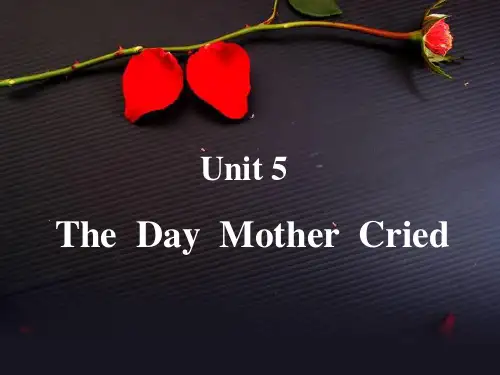
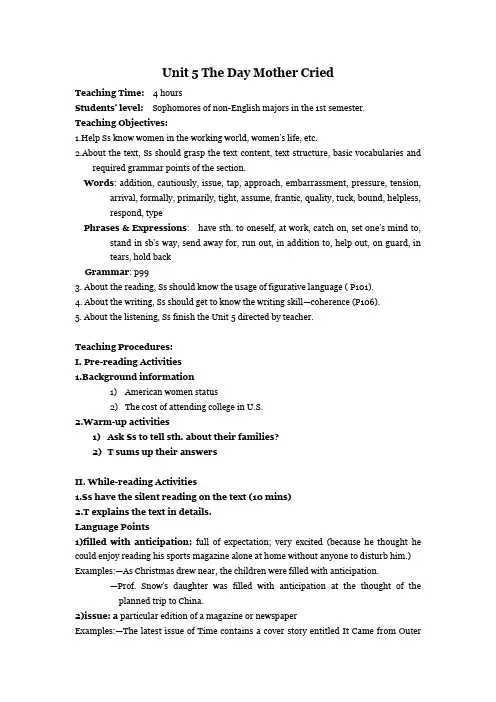
Unit 5 The Day Mother CriedTeaching Time: 4 hoursStudents’ level: Sophomores of non-English majors in the 1st semester.Teaching Objectives:1.Help Ss know women in the working world, women’s life, etc.2.About the text, Ss should grasp the text content, text structure, basic vocabularies andrequired grammar points of the section.Words: addition, cautiously, issue, tap, approach, embarrassment, pressure, tension, arrival, formally, primarily, tight, assume, frantic, quality, tuck, bound, helpless,respond, typePhrases & Expressions: have sth. to oneself, at work, catch on, set one’s mind to, stand in sb’s way, send away for, run out, in addition to, help out, on guard, intears, hold backGrammar: p993. About the reading, Ss should know the usage of figurative language ( P101).4. About the writing, Ss should get to know the writing skill—coherence (P106).5. About the listening, Ss finish the Unit 5 directed by teacher.Teaching Procedures:I. Pre-reading Activities1.Background information1)American women status2)The cost of attending college in U.S.2.Warm-up activities1)Ask Ss to tell sth. about their families?2)T sums up their answersII. While-reading Activities1.Ss have the silent reading on the text (10 mins)2.T explains the text in details.Language Points1)filled with anticipation: full of expectation; very excited (because he thought he could enjoy reading his sports magazine alone at home without anyone to disturb him.) Examples:—As Christmas drew near, the children were filled with anticipation.—Prof. Snow's daughter was filled with anticipation at the thought of theplanned trip to China.2)issue: a particular edition of a magazine or newspaperExamples:—The latest issue of Time contains a cover story entitled It Came from OuterSpace.—These back issues of magazines and newspapers take up the much space in thestudy.Do you still have any use for them?3)…and (I had) the house to myself…I’d be alone in the house to have sth. to oneself: to have sth. for one's own private useExamples:—When he dines in a restaurant Mark likes to have a table to himself.—You can have the place entirely to yourself.4)burst into: rush intoExamples:—Andy burst into the classing, grabbed his books, and rushed out again.5) tight: firmExamples:—She curled up in a tight ball, with her knees tucked up at her chin.—I’m dismayed to find I've outgrown this expensive coat, which is too tight for me.6)approach: move towards; come or go near or nearerExamples:—The dog remains alert all the time and recognizes its master's footsteps as he approaches the house.—The police warned the schoolchildren not to approach the madman if they saw him.7)cautiously: very carefullyExamples:—The first time two people from different cultures meet, they behave and talk cautiously so as not to cause offense.—Tom moved cautiously forward and opened the door softly.8)catch on:understand, learn about (often used with ‘to’ )Examples:—You’ll catch on to the job (You’1l get some idea of how to do the job) after you’ve been here a week or two.—The first time the teacher explained the problem, only a few students caught on. 9. set one’s mind to: give all one’s attention to doing (sth.) Examples:—After hearing the sad news, Jack could not set his mind to his work that afternoon.—If I set my mind to fit1ishing this article by tomorrow, I can certainly do so. 9)assume: take as true without actual proofExamples:—I assume that you agree with what Mary has just said.—David is not such a fool as You assume him to be.10). …that didn’t stand in her way:…her having had no training didn’t prevent her from becoming a nursery teacherstand/be in sb’s way: prevent sb. from doing sth.Examp1es:—lf you think you can get a better job elsewhere, I'll certainly not stand in your way.—Jane tried to clean the house, but her 16-month-old baby was always inher/the way.11) send away for: make a request or order for (sth, ) by postExamples:—When the Smiths lived in the country, they had to send away for rnany of the things they needed.—This book is not available in our town, so I’ve sent away for it.12) qualify: cause sb. to reach the level needed for sth. or to do sth. Examples:—This training will qualify you as a computer operator.—With a Ph. D. degree from Harvard University, he is assumed to be we1Iqualified for this post.13) run out: come to an end: be used, spent or consumedExamples:—Hurry up! Time is running out!—The ran out before most of us could answer the last question.—Their food was running out fast so the mountain climbers had to return to the base. 15. in addition to: besidesExamples:—In addition to or English novels, Mary mailed me an English dictionary.—In addition to teaching in the school, Janet gives piano lessons to somechildren at home.14)respond: do sth. as an answerExamples:—As the news of the earthquake got around, people across the nation responded by pro-viding what they could offer.—The child responded to the teacher's praise with a smile.15) help out: give help at a time of need (to sb.)Examples:—Our neighbors helped out when Mother became ill.—Mary lives on campus but on weekends when she goes back home, she oftenhelps out in the kitchen.—Would you please help me out with this math problem?16) on (one’s) guard: watchful; ready to defend or protectExamples:—As the bus was very crowded, the conductor warned the passengers to be on (their) guard against pickpockets.—You should be on guard against those who are always flattering you.(The boy was immediately on guard when his father asked him to help out a bit more because, being 16, he was the young to understand what his mother was doing for him and the whole family.)17) pressure: a compelling influence or forceExamples:—As is the case with students in other countries, American students also face the pres-sure of schoolwork, high living costs and decision-making on theircareers.—Jim changed his mind at the last minute under pressure from his parents. 18)sometime, some time, sometimes:sometime: at some uncertain or unstated timeExamples:—He first came to China sometime around 1932.—They’ll meet again sometime next week.some time: a certain amount of timeExample:—It will take some time to read the whole book.sometimes: at times, now and thenExample:—Sometimes I come to school by bus and sometimes on foot.19)tension: a feeling of worry and nervousnessExamples:—With tension in her voice Ann said she had me bad news to tell me.—Just before the job interview, the young man felt his tension building.20) hold back: controlExamples:—Mr. Jackson managed to hold back his alleger and avoided a quarrel with his 16-year-old son.—When she learned that her son was killed in battle, the Mexican woman heldback her tears with much difficulty.21)…there was something more going on in there than a woman learning t o type:…besides learning to type, Mother was also showing her determination to overborne whatever difficulties she might meet with, her strong will not to accept defeat easily and her courage to go ahead.22) memento: a small object which reminds one of a holiday, a friend, etc. Examples:—These post cards are mementos of their trip to Italy.—This gold pen is a memento of his grandfather.23) give up: admit defeat; stop tryingExamp1es:—I give up. I can't work the problem out.—You gave up too easily. You could have worked it out if you had really set yourmind to it.3.T asks Ss to come out the main idea, structure of the text (10mins)4.T summarizes the main idea and structure of the text (5 mins)III. Post-reading Activities1.Let the students do the exercises in the textbook which are related to the new words.2.Ss hand in the summary of the text.3.Ss discuss the questions on the topic related to the text.4.Let Ss do the exercises in the text book which are mainly related to the new words and topic.。
UNIT 1:A Brush with the LawAnd so I do not have a criminal record. But what was most shocking at the time was the things my release from the charge so clearly depended on. I had the 'right' accent, respectable middle-class parents in court, reliable witnesses, and I could obviously afford a very good solicitor. Given the obscure nature of the charge, I feel sure that it I had come from a different background, and had really been unemployed, there is every chance that I would have been found guilty. While asking for costs to be awarded, my solicitor's case quite obviously revolved around the fact that I had a 'brilliant academic record'.所以我就没有了犯罪记录。
但当时,非常令人震惊的是宣布我无罪所明显依赖的事实。
即我操着标准的口音,我受人敬重的中产阶级的父母到了法庭,我有可靠的证人,并且看得出我能请得起一位很好的律师。
想到这次起诉时那种莫明其妙的做法,我敢肯定如果我出生于另一种背景的家庭,并真正是失了业,那很有可能我被判为有罪。
---------------------------------------------------------------最新资料推荐------------------------------------------------------ 人教版英语必修三第五单元课文翻译人教版英语必修三第五单元课文翻译 Unit 5Reading 真北方之旅李黛予和她表妹刘倩要去加拿大大西洋海岸的蒙特利尔市看望她们的表兄妹们。
她们不想一路乘飞机,她们决定飞到温哥华,再从西海岸乘火车横穿加拿大到达东海岸。
要横贯整个大陆的想法很是令人兴奋。
她们的朋友林丹尼在机场等候她们。
他要带着她们和行李到火车站乘坐横穿加拿大的真北方号列车。
在去火车站的路上,林丹尼聊起了她们的旅程:你们沿途将会看到美丽壮阔的风景。
向东一直走,你们会经过一座座山脉,上千个湖泊、森林,还有宽阔的河流和许多大城市。
有人想在不到五天的时间里横穿加拿大,他们忘了加拿大从东海岸到西海岸共有 5, 500 公里。
这儿,温哥华,是加拿大最温暖的地方。
人们说温哥华是加拿大最美丽的城市,被大山和太平洋环抱。
落基山可以滑雪,海港供你扬帆,这些使得温哥华成为加拿大最受欢迎的居住城市之一。
这个城市的人口增长很快。
1/ 5在温哥华北面的海岸上保存了最古老、最美丽的森林。
那儿的湿度很大,所以树都长得特别高,一些高达 90 多米。
那天下午表姐俩才登上了火车落了座。
火车先是穿越落基山脉,她们设法看到了野山羊,甚至还看到了一只大灰熊和一只鹰。
她们的下一站就是卡尔加里,这个城市因大西部赛马会而闻名。
来自世界各地的牛仔们来参加赛马会比赛。
他们中许多人都有骑野马的本领,他们能赢得几千美元的奖金。
两天以后,她们开始意识到加拿大人烟稀少。
他们在学校学过,大多数加拿大人定居在靠近美国几百英里的边境地带,加拿大的人口也就是三千万多一点儿。
但是现在看到这么空旷的国家,她们很惊讶。
火车穿过一个种植小麦的省份,她们看到了面积有数千英亩的农场。
Unit 5 The Day Mother CriedGerald MooreA mother and her son learn more form a moment of defeat than they ever could from a victory. Her example of never giving up gives him courage for the rest of his life.Coming home from school that dark winter's day so long ago, I was filled with anticipation. I had a new issue of my favorite sports magazine tucked under my arm, and the house to myself. Dad was at work, my sister was away, and Mother wouldn't be home from her new job for an hour. I bounded up the steps, burst into the living room and flipped on a light.I was shocked into stillness by what I saw. Mother, pulled into a tight ball with her face in her hands, sat at the far end of the couch. She was crying. I had never seen her cry.I approached cautiously and touched her shoulder. "Mother?" I said "What's happened?" She took a long breath and managed a weak smile. "It's nothing, really. Nothing important. Just than I'm going to lose this new job. I can't type fast enough.""But you've only been there three days," I said. "You'll catch on." I was repeating a line she had spoken to me a hundred times when I was having trouble learning or doing something important to me."No." she said sadly. "I always said I could do anything I set my mind to, and I still think I can in most things. But I can't do this."I felt helpless and out of place. At age 16 I still assumed Mother could do anything. Some years before, when we sold our ranch and moved to town, Mother had decided to open a day nursery. She had had no training, but that didn't stand in her way. She sent away for correspondence courses in child care, did the lessons and in six months formally qualified herself for the task. It wasn't long before she had a full enrollment and a waiting list. I accepted all this as a perfectly normal instance of Mother's ability.But neither the nursery nor the motel my parents bought later had provided enough income to send my sister and me to college. In two years I would be ready for college. In three more my sister would want to go. Time was running out, and Mother was frantic for ways to save money. It was clear that Dad could do no more than he was doing already——farming 80 acres in addition to holding a fulltime job.A few months after we'd sold the motel, Mother arrived home with a use typewriter. It skipped between certain letters and the keyboard was soft. At dinner that night I pronounced the machine a "piece of junk.""That's all we can afford," mother said. "It's good enough to learn on." And from that day on, as soon as the table was cleared and the dishes were done, Mother would disappear into her sewing room to practice. The slow tap, tap, tap went on some nights until midnight.It was nearly Christmas when I heard Mother got a job at the radio station. I was not the least bit surprised, or impressed. But she was ecstatic.Monday, after her first day at work, I could see that the excitement was gone. Mother looked tired and drawn. I responded by ignoring her.Tuesday, Dad made dinner and cleaned the kitchen. Mother stayed in her sewing room, practicing. "Is Mother all right?" I asked Dad."She's having a little trouble with her typing," he said. "She needs to practice. I think she'd appreciate it if we all helped out a bit more.""I already do a lot," I said, immediately on guard."I know you do," Dad said evenly. "And you may have to do more. You might just remember that she is working primarily so you can go to college."I honestly didn't care. I wished she would just forget the whole thing.My shock and embarrassment at finding Mother in tears on Wednesday was a perfect index of how little I understood the pressures on her. Sitting beside her on the couch, I began very slowly to understand."I guess we al have to fail sometime," Mother said quietly. I could sense her pain and the tension of holding back the strong emotions that were interrupted by my arrival. Suddenly, something inside me turned. I reached out and put my arms around her.She broke then. She put her face against my shoulder and sobbed. I help her close and didn't try to talk. I knew I was doing what I should, what I could, and that it was enough. In that moment, feeling Mother's back racked with emotion, I understood for the first time her vulnerability. She was still my mother, but she was something more: a person like me, capable of fear and hurt and failure. I could feel her pain as she must have felt mine on a thousand occasions when I had sought comfort in her arms.A week later Mother took a job selling dry goods at half the salary the radio station had offered. "It's a job I can do," she said simply. But the evening practice sessions on the old green typewriter continued. I had a very different feeling now when I passed her door at night and heard her tapping away. I knew there was something more going on in there than a woman learning to type.When I left for college two years later, Mother had an office job with better pay and more responsibility. I have to believe that in some strange way she learned as much fromher moment of defeat as I did, because several years later, when I had finished school and proudly accepted a job as a newspaper reporter, she had already been a journalist with our hometown paper for six months.The old green typewriter sits in my office now, unrepaired. It is a memento, but what it recalls for me is not quite what if recalled for Mother. When I'm having trouble with a story and think about giving up or when I start to feel sorry for myself and think things should be easier for me, I roll a piece of paper into that cranky old machine and type, word by painful word, just the way mother did. What I remember then is not her failure, but her courage, the courage to go ahead.It's the best memento anyone ever gave me.妈妈哭泣的那一天很久以前一个昏暗的冬日,我放学回家时从满了期望。
【导语】本⽂《新视野⼤学英语第三册Unit5课⽂翻译》由写作翻译频道整理,仅供参考。
如果觉得很不错,欢迎点评和分享~感谢你的阅读与⽀持! 我从未见过克拉克夫⼈,但看过她的医疗记录和上⼀位值班医⽣交给我的报告后,我知道她今晚会去世。
她屋⾥的光线来⾃⼀台医疗设备,它闪着红光,似乎在发出警告。
我站在那⾥,⼀股怪味刺激着我的⿐⼦,我想起了过去闻到过的腐烂的⽓味,我闭上了眼睛。
我嘴⾥有⼀股从胃⾥返上来的酸味。
我伸⼿去开灯。
灯静静地照亮了整个病房,我⾛回病床边,⽤⽆动于衷的、医⽣的⽬光观察着病⼈。
克拉克夫⼈已奄奄⼀息了。
她⼀动不动地躺着:⾻瘦如柴的⾝体使她的头显得特别⼤;⽪肤呈暗黄⾊,松松地裹在嶙峋的、连⽑毯也遮掩不住的⾻骼上;她的右臂平伸在床边,被⽆情地⽤胶带固定在⼀块板上,以便能固定针头使液体滴⼊;左臂横放在深陷的胸部,胸⼝随着不均匀的呼吸⼀起⼀伏。
我伸⼿去触摸她放在胸⼝的细长⼿指。
冰凉冰凉的。
我忙将⼿移到她的⼿腕,去感觉那微弱的脉搏。
克拉克夫⼈将头稍稍转向我,微微地睁开眼。
我俯过⾝去,勉强听见她微弱的声⾳:“⽔。
” 我从桌上拿起⼀杯⽔,⽤⼿指封着吸管的⼀端,滴了⼏滴凉凉的⽔到她的嘴⾥,以缓解她的⼲渴。
她没有⽤⼒去吞咽,因为⼒⽓不够。
“还要,”那⼲涩的声⾳说。
于是我们⼜重复了⼀次。
这次她终于咽了⼀些,并轻轻说了声:“谢谢,你。
” 她虚弱得没法交谈,因此没等她要求,我就开始做她所需要的。
我像抱孩⼦似的把她抱起来,给她翻了个⾝。
除了⼀件浅⾊的病号服,她什么也没穿。
她⼜⼩⼜轻,像遭受了严重饥荒⼀样。
我打开护肤霜的瓶盖,揩了⼀些在⼿⼼。
为了不伤着她,我⼩⼼翼翼地把护肤霜擦在她发黄的⽪肤上。
她的⽪肤松松地在⾻头上滑动,背上每块⾻头的轮廓都能清楚地摸到。
当我把枕头放在她两腿之间时,发现它们也是冰凉的,直到把⼿移到她膝盖以上的部位,我才感受到⾎液供给⽣命的热度。
⽽后,我挪了把椅⼦⾯朝她坐在床边,握住她那只没被固定的⼿,此时我⼜⼀次注意到她细长的⼿指。
Unit 5 The Day Mother CriedGerald MooreA mother and her son learn more form a moment of defeat than they ever could from a victory. Her example of never giving up gives him courage for the rest of his life.Coming home from school that dark winter's day so long ago, I was filled with anticipation. I had a new issue of my favorite sports magazine tucked under my arm, and the house to myself. Dad was at work, my sister was away, and Mother wouldn't be home from her new job for an hour. I bounded up the steps, burst into the living room and flipped on a light.I was shocked into stillness by what I saw. Mother, pulled into a tight ball with her face in her hands, sat at the far end of the couch. She was crying. I had never seen her cry.I approached cautiously and touched her shoulder. "Mother?" I said "What's happened?" She took a long breath and managed a weak smile. "It's nothing, really. Nothing important. Just than I'm going to lose this new job. I can't type fast enough.""But you've only been there three days," I said. "You'll catch on." I was repeating a line she had spoken to me a hundred times when I was having trouble learning or doing something important to me."No." she said sadly. "I always said I could do anything I set my mind to, and I still think I can in most things. But I can't do this."I felt helpless and out of place. At age 16 I still assumed Mother could do anything. Some years before, when we sold our ranch and moved to town, Mother had decided to open a day nursery. She had had no training, but that didn't stand in her way. She sent away for correspondence courses in child care, did the lessons and in six months formally qualified herself for the task. It wasn't long before she had a full enrollment and a waiting list. I accepted all this as a perfectly normal instance of Mother's ability.But neither the nursery nor the motel my parents bought later had provided enough income to send my sister and me to college. In two years I would be ready for college. In three more my sister would want to go. Time was running out, and Mother was frantic for ways to save money. It was clear that Dad could do no more than he was doing already——farming 80 acres in addition to holding a fulltime job.A few months after we'd sold the motel, Mother arrived home with a use typewriter. It skipped between certain letters and the keyboard was soft. At dinner that night I pronounced the machine a "piece of junk.""That's all we can afford," mother said. "It's good enough to learn on." And from that day on, as soon as the table was cleared and the dishes were done, Mother would disappear into her sewing room to practice. The slow tap, tap, tap went on some nights until midnight.It was nearly Christmas when I heard Mother got a job at the radio station. I was not the least bit surprised, or impressed. But she was ecstatic.Monday, after her first day at work, I could see that the excitement was gone. Mother looked tired and drawn. I responded by ignoring her.Tuesday, Dad made dinner and cleaned the kitchen. Mother stayed in her sewing room, practicing. "Is Mother all right?" I asked Dad."She's having a little trouble with her typing," he said. "She needs to practice. I think she'd appreciate it if we all helped out a bit more.""I already do a lot," I said, immediately on guard."I know you do," Dad said evenly. "And you may have to do more. You might just remember that she is working primarily so you can go to college."I honestly didn't care. I wished she would just forget the whole thing.My shock and embarrassment at finding Mother in tears on Wednesday was a perfect index of how little I understood the pressures on her. Sitting beside her on the couch, I began very slowly to understand."I guess we al have to fail sometime," Mother said quietly. I could sense her pain and the tension of holding back the strong emotions that were interrupted by my arrival. Suddenly, something inside me turned. I reached out and put my arms around her.She broke then. She put her face against my shoulder and sobbed. I help her close and didn't try to talk. I knew I was doing what I should, what I could, and that it was enough. In that moment, feeling Mother's back racked with emotion, I understood for the first time her vulnerability. She was still my mother, but she was something more: a person like me, capable of fear and hurt and failure. I could feel her pain as she must have felt mine on a thousand occasions when I had sought comfort in her arms.A week later Mother took a job selling dry goods at half the salary the radio station had offered. "It's a job I can do," she said simply. But the evening practice sessions on the old green typewriter continued. I had a very different feeling now when I passed her door at night and heard her tapping away. I knew there was something more going on in there than a woman learning to type.When I left for college two years later, Mother had an office job with better pay and more responsibility. I have to believe that in some strange way she learned as much fromher moment of defeat as I did, because several years later, when I had finished school and proudly accepted a job as a newspaper reporter, she had already been a journalist with our hometown paper for six months.The old green typewriter sits in my office now, unrepaired. It is a memento, but what it recalls for me is not quite what if recalled for Mother. When I'm having trouble with a story and think about giving up or when I start to feel sorry for myself and think things should be easier for me, I roll a piece of paper into that cranky old machine and type, word by painful word, just the way mother did. What I remember then is not her failure, but her courage, the courage to go ahead.It's the best memento anyone ever gave me.妈妈哭泣的那一天很久以前一个昏暗的冬日,我放学回家时从满了期望。